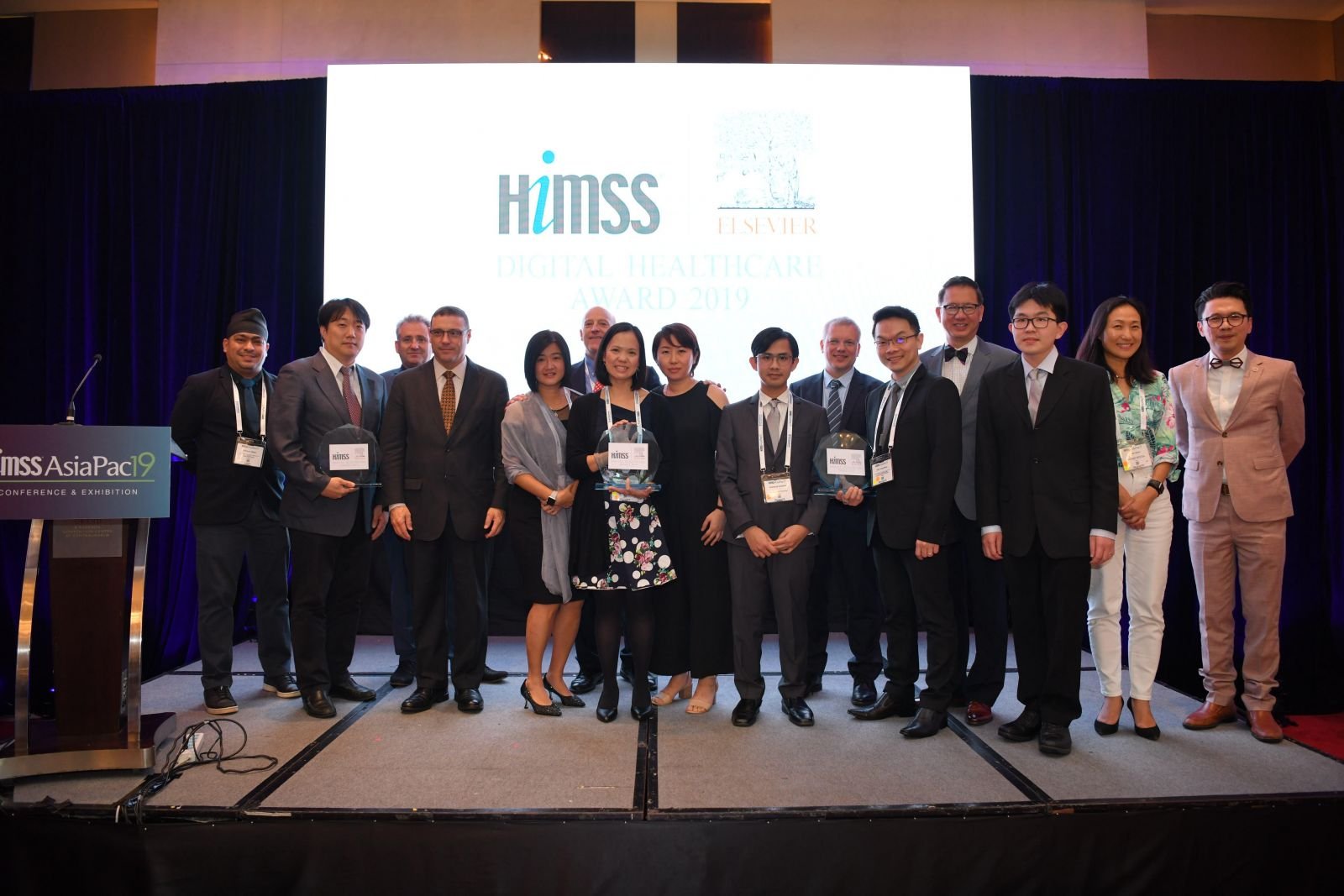
Winners and Judges of the HIMSS-Elsevier Digital Awards 2019
The Asia Pacific HIMSS-Elsevier Digital Healthcare Award winners were announced on Tuesday, 8 October, at an exclusive gala dinner ceremony during the HIMSS AsiaPac19 Conference in Bangkok, Thailand.
The winners are from hospitals in Thailand, Singapore, India and South Korea: Faculty of Medicine, Chulalongkorn University, Bumrungrad Hospital; Tan Tock Seng Hospital; Nanavati Super Specialty Hospital; and Seoul National University Bundang Hospital.
The HIMSS-Elsevier Digital Healthcare Award recognises organisations for their outstanding innovation and achievement in implementing and using health information and technology to improve patient care and safety. There were four finalists shortlisted per award category, namely: Outstanding ICT Innovation and Outstanding ICT Achievement; with two winners announced per category.
The winners in the Outstanding ICT Innovation category are:
Faculty of Medicine, Chulalongkorn University, Bumrungrad Hospital, Thailand for its project “Deep Learning for
Automated Classification of Tuberculosis-Related Chest X-Ray (DAC4TB)”
DAC4TB was initially a self-funded deep learning platform for active tuberculosis screening in resource-limited nonhospital settings. It has been tested and successfully deployed in both off-site and on-site settings. For off-site setting, DAC4TB can interpret as fast as 2 CXR images per second (120 images/minute). That means 100,000 CXR images taken from the mobile screening over a 5-month period could be interpreted in less than a day.
DAC4TB’s ability to rapidly screen all the CXR images and report a prioritized list of suspected individuals that require immediate attention – all without the need for an internet connection – means faster turnaround time in notifying individuals with either high tuberculosis scores or low confidence levels to undergo further testing and treatment.
Tan Tock Seng Hospital, Singapore for its project “PreSAGE – A Smart Bed-Exit Prediction and Prevention System Based on Thermal Sensing”
Tan Tock Seng Hospital (TTSH) co-developed PreSAGE – a smart bed-exit prediction and prevention system based on thermal sensing. Trained on 12,000 hours of real patient thermal data, PreSAGE provides accurate early warning based on machine learning models that predicts bed exit. The alarm is triggered whenever a positive bed-exit is predicted and is disarmed automatically when a nurse is at the bedside, and rearmed automatically when the patient is alone.
PreSAGE has been deployed in TTSH’s general wards, with studies that show a 99.7% sensitivity and 100% specificity. As the system requires minimal maintenance and is easy to set up, this will project to save up to 30% Nursing FTE for falls prevention surveillance and directly translates into safer care for patients, reduction in false alarms, better nursing productivity and essentially higher morale among the nurses.
The winners in the Outstanding ICT Achievement category are:
Nanavati Super Specialty Hospital, India for its project “Operational Efficiency enhancement in the Discharge Process of Inpatients, by Implementing Operations BOTs Enabled Real-time Monitoring of the Discharge Process and the
Patient Experience”
ExperienceFlow is a new class of AI-based Operations Transformation Platform that acts as a Digital Nervous System for Hospital Operations. ExperienceFlow’s monitors' inpatient discharge processes and assists all levels of hospital operations team in real-time to reliably and consistently follow through with interventions suggested by the platform.
Consequently, there has been a drastic reduction in the outliers and turnaround time for discharge and bed release from the software. Real-time monitoring also provides updated status of vacant beds, beds under discharge, scheduled discharges list thus providing a clear overview in the planning and allocation of beds to patients.
Seoul National University Bundang Hospital (SNUBH), South Korea for its project “The Clinical Data Warehouse, Health Information Exchange and Closed-Loop Medication Administration System (CLMA)”
The clinical data warehouse, health information exchange and closed-loop medication administration system (CLMA) uses RFID and barcode technology and covers pharmacy, medication administration, blood bank, and a communal space for storing human milk.
The RFID and barcode system enables a safer hospital environment where care practices provided to inpatients are conveniently and accurately documented by cross-checking patient information with medical orders. Consequently, the incident rate of patient safety related to medication decreased by an average of 16.35 % by each quarter compared to 2013 after implementing the upgraded PDA system in June 2018.
Jan Herzhoff, Managing Director for APAC Health Market, Elsevier, said “Congratulations to the winners of the 2019 Asia Pacific HIMSS-Elsevier Digital Healthcare Award! Every year, it is a great privilege for Elsevier to recognize these outstanding health ICT innovations which are paving the way for a better quality of care and patient outcomes. We hope to continue inspiring more organizations to strive toward digital transformation and excellence.”
The Asia Pacific edition of the HIMSS-Elsevier Digital Healthcare Award is now into its seventh year of recognizing ICT achievements and innovations across the region, with the Award also hosted in Europe, Middle East and Latin America.




